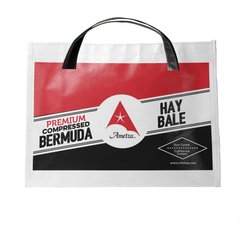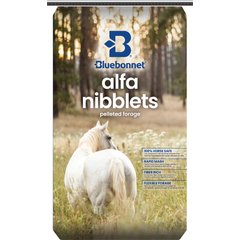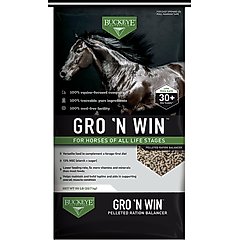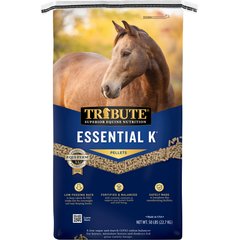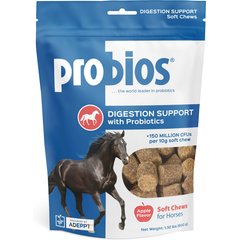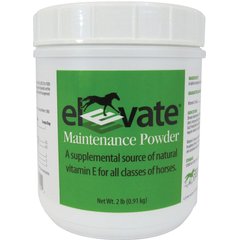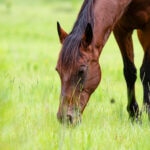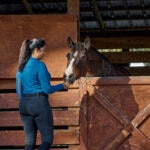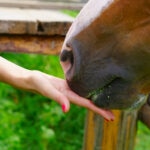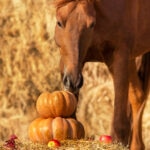Horse Feeding: 8 Essential Things To Know + Equipment Checklist
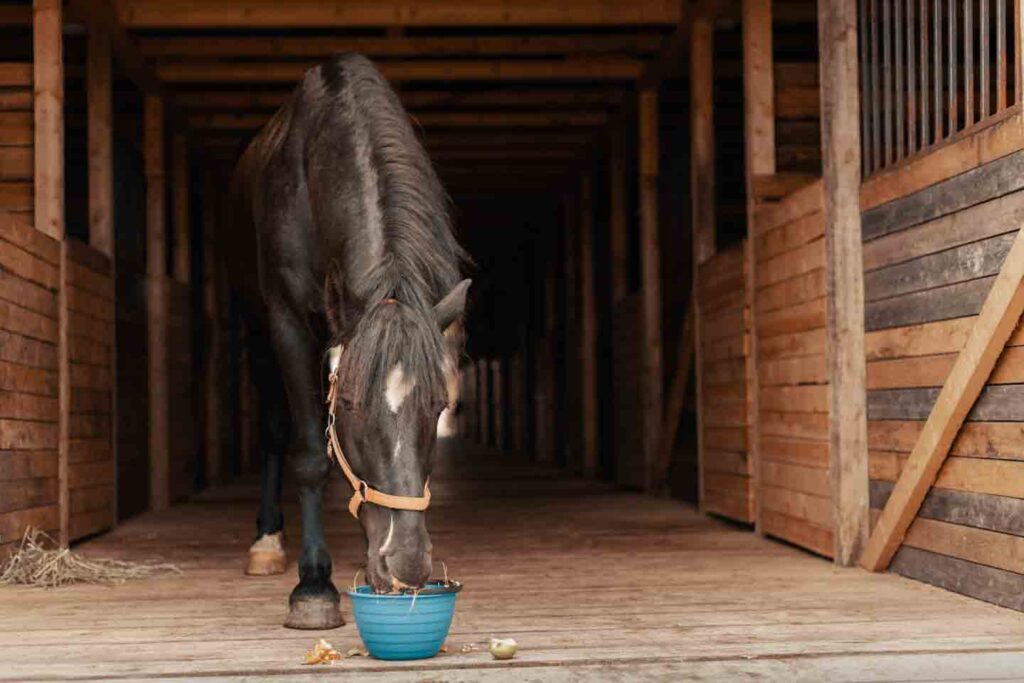
Photo by virgonira/iStock/Getty Images Plus
Equine nutrition—it’s both an art and a science. Understanding what nutrients horses need, and also healthy ways to meet these nutritional requirements, can make the difference between a thriving horse and one who’s held back from achieving their best performance and life. Here’s some practical horse feeding advice to help you feel confident that you’re feeding your horse the optimal diet.
How Does a Horse’s Digestive System Work?
Horses are herbivores, and the most prominent feature of their equine digestive tract is a huge hindgut, or large intestine. A horse’s hindgut can be up to 30 feet long—the length of a school bus! Horses use their hindgut to ferment the volatile fatty acids (VFAs) in their food—that’s how they extract energy from forages like grass and hay.
Horses also don’t have a gallbladder, which means their stomach constantly secretes bile (digestive fluid). If there isn’t food to break down, the bile will start attacking the stomach lining itself. Both the hindgut fermentation and constant bile production mean horses need to eat small amounts of roughage throughout the day to keep their gut happy and healthy and to meet their nutritional needs.
What Nutrients Do Horses Need?
A variety of nutrients contribute to overall horse health, which can be classified into seven different categories:
- Water is often overlooked, but it’s actually the single most critical nutrient for survival. On average, horses need to drink 5-15 gallons of fresh water per day.
- Carbohydrates are macronutrients that give horses energy. Carbohydrates are either structural (those found in hay) or non-structural (the carbs of grain, grass and treats).
- Protein is another macronutrient. Made up of chains of amino acids, protein plays a big role in the growth, maintenance and repair of muscles and other body tissues.
- Fat is the third macronutrient. It provides a concentrated and relatively safe source of energy.
- Fiber is especially important to horses, as they extract a lot of their energy from its fermentation. Fiber also supports healthy digestion.
- Vitamins (specifically A, B, C and E) are micronutrients found in the diet that facilitate various body functions, from immunity to energy metabolism.
- Minerals—like calcium and phosphorus—are also micronutrients, and their consumption is necessary for the proper function of several of a horse’s tissues, from their bones to their muscles.
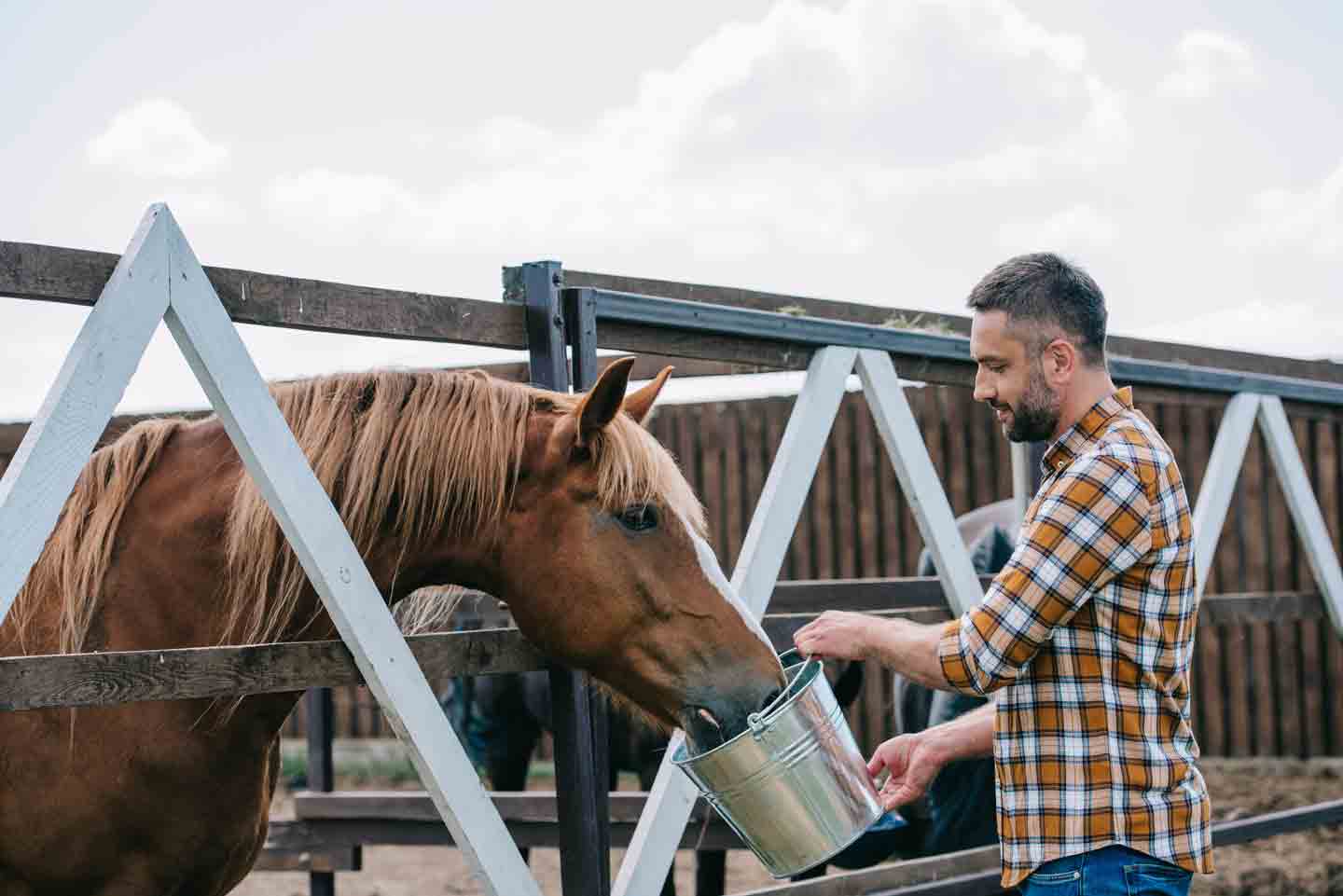
LightFieldStudios/iStock/Getty Images Plus
What’s the Difference Between Horse Feeds?
Horse feed can be split into two categories: forage and concentrates. To keep your horse’s gut happy and help reduce their risk of developing colic (severe abdominal pain) or gastric ulcers, forage should make up the majority of their diet.
Forage, or roughage, is the most natural type of feed for horses to consume. Forage includes grass, hay and hay products like haylage and hay pellets. Horse hay can come from grass (e.g., orchardgrass, timothy) or from legumes, the most common one being alfalfa.
A popular type of grass hay is “grass mix,” which can include a blend of dried orchardgrass, timothy and ryegrass, among other grass species. If you’re trying to add “fuel” to your horse’s ration, alfalfa hay is a good source of protein, which the horse’s body can convert into energy.
Recommended Products
Concentrates, meaning grain or sweet feed, are designed to add calories to a horse’s diet. Not all horses need grain. These should be used to complement a forage-based diet when a horse can’t consume enough grass or hay in a day to maintain their weight and energy.
For example, some horses, known as easy keepers, don’t need any concentrates to maintain their ideal weight or body condition. But easy keepers who live on hay only—no grass—are likely to develop vitamin and mineral deficiencies because many of the nutrients in grass are lost in the drying process to make hay. A veterinarian may recommend supplementing their diet with a specialized formula called a ration balancer. These pellets are enriched with important vitamins and minerals without being a significant source of calories for your horse.
Other concentrates contain different percentages of carbohydrate, fat and protein contents adapted to the needs of different horses.
“Ideally, have your hay lab-tested to determine its nutritional content,” recommends Jeremy Frederick, DVM, owner of Advanced Equine of the Hudson Valley, an equine veterinary practice based in Wappingers, New York. “The results will allow you to make informed decisions about any concentrate feed or supplements that may be beneficial to balance the ration.” Talk to your veterinarian about your horse’s diet to ensure you’re providing all the nutrients they need.
Recommended Products
How Much Do You Feed a Horse?
Just like people, horses have different nutritional needs based on their age, body weight, metabolism, health and activity levels—which means that some horses will need a higher amount of feed than others. In addition, pregnant and lactating mares, as well as growing and working horses, need different diets than their idle, mature counterparts.
So, how do you know how much to feed your horse? Start with the National Research Council’s (NRC) guidelines for feeding horses at different levels of work:
Feed Chart: Basic Daily Nutrient Requirements of Mature Horses on a Dry Matter Basis
| Type of Horse: | Body Weight (lb) | Digestible Energy (Mcal) | Crude Protein (g) |
|---|---|---|---|
| Maintenance | 1,100 | 16.4 | 656 |
| Light Work | 1,100 | 22.0 | 820 |
| Moderate Work | 1,100 | 27.0 | 984 |
| Intense Work | 1,100 | 35.0 | 1,312 |
Once you know how much energy and protein your horse needs, it’s time to figure out how to provide that in their diet. Start with forage, since it should make up the majority of your horse’s food. As a general rule, equine nutritionists recommend feeding at least 2% of your horse’s body weight in high-quality forage daily. For example, a 1,000-pound horse needs to eat 20 pounds of hay per day; that’s anywhere from half a bale to a full bale, depending on the bale’s size.
Once you know how many pounds of forage you’ll feed your horse, it’s time to determine how much energy and protein your horse is getting from that food. If you’ve had your hay lab-tested, you’ll know its nutritional content. If that forage provides the recommended amount of digestible energy and crude protein for your horse, you may not need to add concentrates to their diet.
If your horse does need more energy or protein than their forage provides to maintain a healthy body weight, or if their diet is lacking in nutrients (as with horses who don’t eat fresh grass), you’ll need to add a concentrate. The amount of concentrates your horse needs varies from horse to horse, too. For easy keepers who subsist solely on hay, for instance, your vet may recommend giving 1-2 pounds/day of a ration balancer.
Horse grain should never be fed on an empty stomach. Because it has a high acidity content, grain can contribute to the development of gastric ulcers. Give your horse access to hay or grass first, before you feed grain, to create a protective buffer for the stomach. You should also split any grain rations into two or more meals if they need more than a couple of pounds of concentrates per day, to reduce their risk of impaction colic (digestive blockage).
How Often Do You Feed a Horse?
Having evolved as roaming herbivores, horses do best with free-choice access to forage rather than set meals. In terms of a feeding schedule, trickle feeding—ingesting small amounts of hay or grass throughout the day—is important for both their digestive and mental health. Continuous access to roughage helps prevent the occurrence of stereotypical behaviors such as cribbing (repetitive biting on objects) and the development of stomach ulcers and other digestive troubles.
To give a sample feeding schedule, a barn could top off hay nets first thing in the morning, then feed morning grain (up to 5 pounds per meal) with any supplements and oral medications that the horse needs. A second grain meal is usually fed in the afternoon.
If doable for your particular barn, it’s never a bad idea to split large grain meals into three or more feedings. The hay supply should be replenished throughout the day as needed, and/or the horses be put out to pasture to graze, if appropriate.
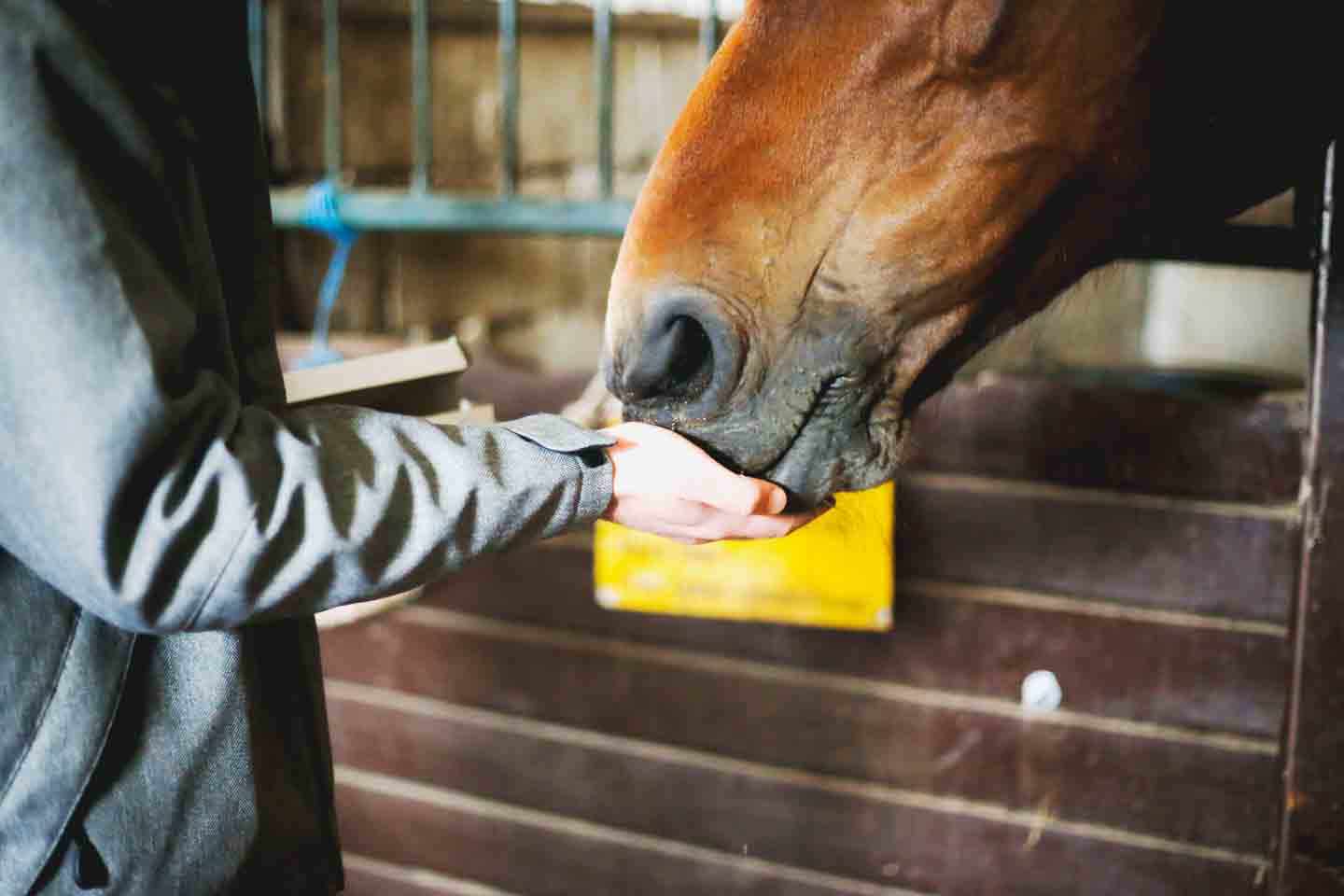
MarijaRadovic/iStock/Getty Images Plus
What Supplements Should You Give to Your Horse?
If your horse has a balanced diet, they may not need any supplements added to their ration at all. That being said, sometimes, specific supplements are a viable solution when you need to compensate for a deficiency in your horse’s diet. For example, a supplement can help a horse maintain healthy muscle mass when the soil—and, therefore, the grass that grows out of it—lacks the vitamin.
“When it comes to dietary supplement recommendations, my general rule is to keep it simple,” says Dr. Frederick. “If you’re in the market for a horse supplement, look for a reputable manufacturer who has data to support the effectiveness of their products.”
“Diagnostic blood work can help determine if a nutritional deficiency is present,” the veterinarian adds. “With vitamin or mineral deficiencies especially, blood screening tests can give you a good place to start.” Talk to your vet if you think your horse’s diet has a deficiency.
Recommended Products
What Are the Signs of Nutritional Deficiencies in Horses?
Aside from relying on blood work, it’s helpful to learn the telltale signs that your horse’s diet isn’t providing all of the nutrients they need to thrive. Signs of a nutritional deficiency in horses include:
- Lethargy
- Reduced willingness to work
- Excessive muscle soreness
- Respiratory difficulties
- Diarrhea or watery stool
- Reduced appetite
- Colic
What Should You Not Feed a Horse?
Don’t feed any of the following to your horse:
- Livestock grain
- Lawn clippings
- Chocolate
- Onions
- Garlic
- Potatoes
You should also avoid feeding spoiled or moldy feed to your horse. “Examine your hay closely, checking for mold or contaminants that will make it less desirable and potentially even dangerous for your animal to eat,” recommends Dr. Frederick.
Food allergies are relatively rare in horses. That being said, some health conditions may dictate what they can and cannot eat. For example, those with conditions such as obesity, insulin resistance (IR), metabolic syndrome (EMS) or laminitis should steer clear of feeds high in non-structural carbohydrates—this includes fresh grass and many commercial concentrates and treats.
Horse Feeding Equipment Checklist
- Grain scoop
- Measuring scale for hay and grain
- Secure storage bins with lids
- Grain buckets
- Feed pans
- Hay net (optional)
- Scissors for cutting open hay bales
- Dry-erase board to write horse’s feeding instructions
- Secure cabinet for supplements and oral medications
FAQs About Horse Feeding
Designing a healthy, balanced diet for your equine companion is an essential part of horse care. Make good quality hay or grass the bulk of their diet, add concentrates as needed to complement their energy intake, and balance the diet with supplements to address any nutritional deficiencies. Bon appétit!
Expert input provided by Dr. Jeremy Frederick, DVM, DACVIM, owner of Advanced Equine of the Hudson Valley, an ambulatory veterinary practice based in Wappingers, New York, that offers nutritional consultations to horse owners, among other services.
This content was medically reviewed by Chewy vets.

